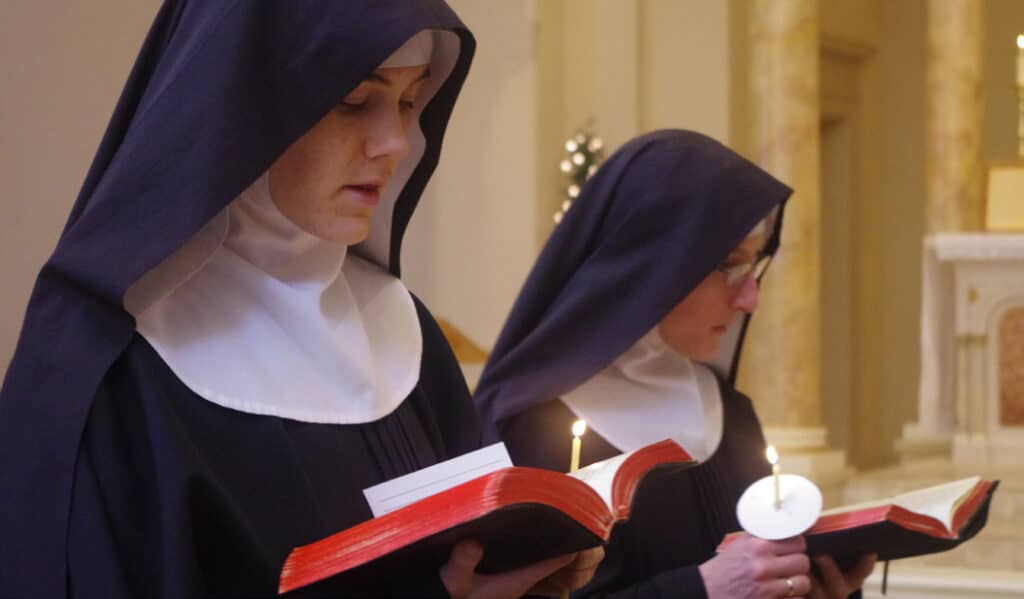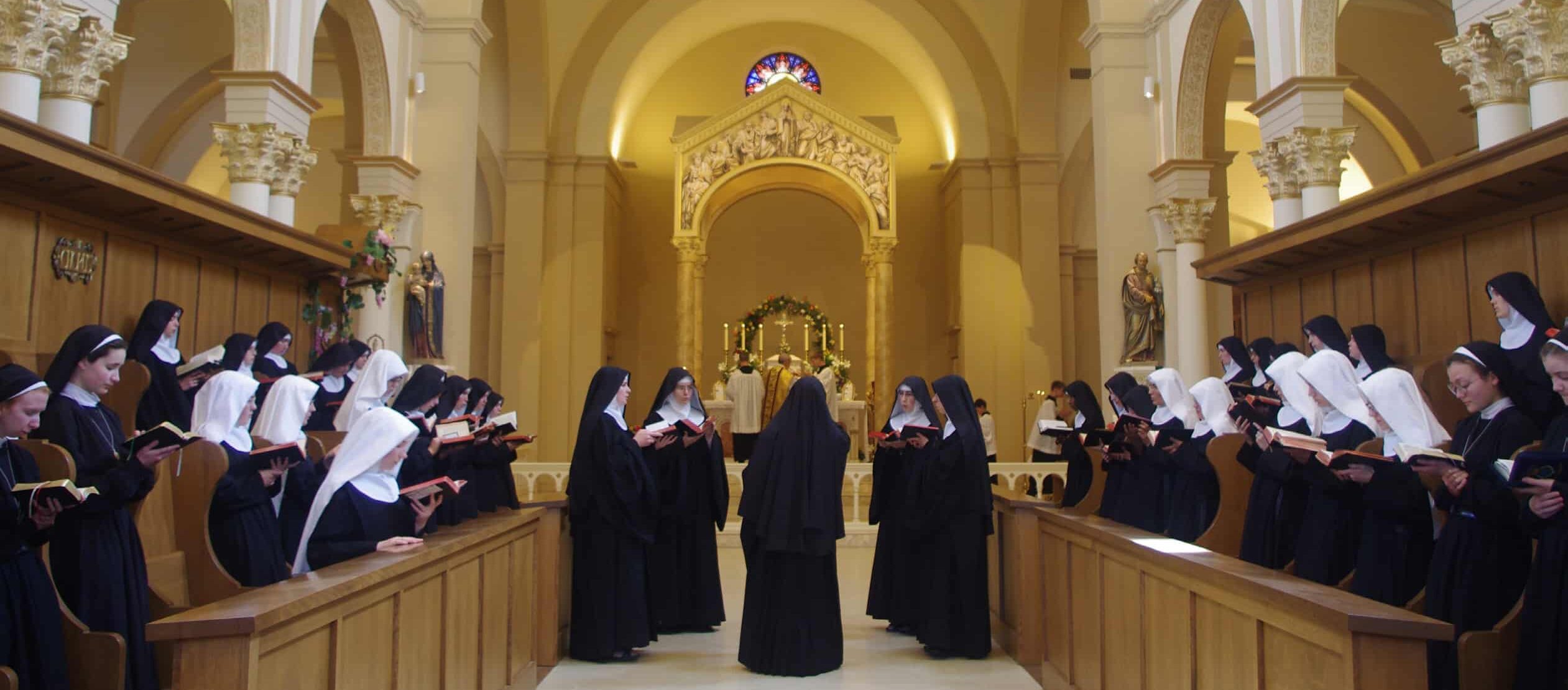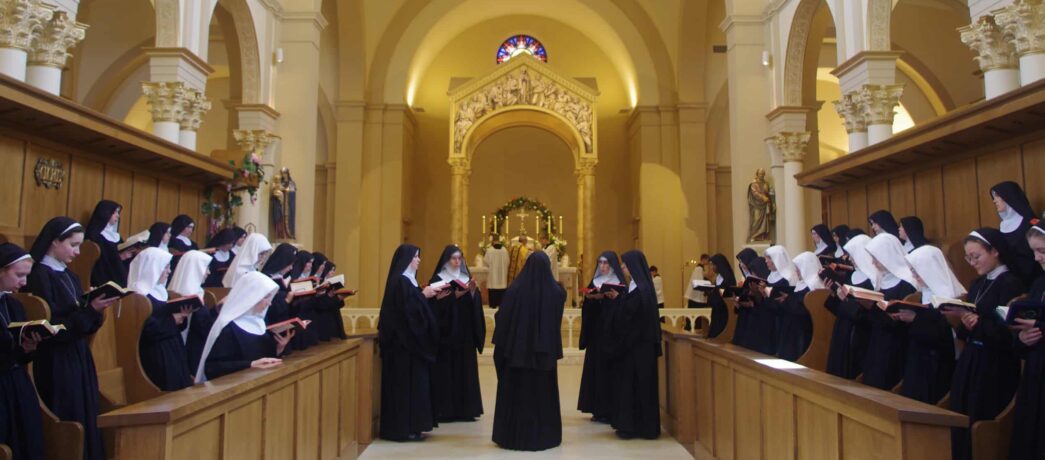This article first appeared in Our Sunday Visitor magazine. Subscribe to receive the monthly magazine here.
In a world that thirsts for meaning, beauty and belonging, the Benedictines of Mary, Queen of Apostles have found a life that quenches the deepest desires of the soul by embracing ancient monastic tradition.
“I think two words that really sum us up are tradition and family,” said Sister Scholastica Radel, novice mistress of the order, which has its motherhouse in Gower, Missouri. “We are keeping alive a 1,500-year tradition in the Benedictine spirituality and liturgy, and keeping together as a family and true spirit of charity.”
Monastic orders have long given spiritual comfort in times of crises. “Monastic orders saved civilization in the Middle Ages, being the reference point of Gospel living,” she told me. “The order of their lives brought about a beautifully ordered culture, centered around the structure of the family and Christian tradition, passing on what has been passed on.”
At the heart of this communal life is the Divine Office, the Church’s timeless prayer offered throughout the day. “The liturgy, called the Divine Office in the ‘Rule of St. Benedict,’ was what drew me here,” Sister Scholastica said. “Especially as we carry it on exactly as described in the ancient rule.” Though she would not call herself a musician, it was in “the age-old prayer of the Church” that she discovered a “call to prayer within the context of community.”
“We find the greatest strength in being together,” she explained. “That is so much of what the liturgy is about. Everyone can and should pray individually, but we feel strongest in that formal commitment of prayer together. This flows out into the work of the day.”
Belonging to community
Community is the very fabric of daily life for the Benedictines. For example, their poverty is not just about material simplicity; it is a deep surrender of self, even in labor. “Everything belongs to the community, including one’s own time and work,” Sister Scholastica shared. “It is a very rare thing to even perform a task from start to finish, and get a sense of accomplishment to call your own. Nine times out of ten, you begin work, and another sister takes it up.”
This cooperation creates not just meals or vestments but a shared identity. “The final product is a real work of cooperation. I think this holds true in prayer as well,” Sister Scholastica explained. “We pray on our own and trust our prayers help the Church, but we really stand in persona ecclesiae when we pray the Divine Office, uniting our wills and voices in a single effort for all of God’s children, ours by adoption as the Bride of Christ.”
The Benedictines’ shared voice has carried beyond the monastery walls, where they have become well-known for their popular recordings of sacred music. Since 2012, the Benedictines have released 14 albums, including several bestsellers. However, the nuns are clear that their intention has always been singular: “Singing our prayer takes self-sacrifice, and we do not see its effects,” Sister Scholastica said. “Even our voices are lost in the whole. Our musical success is something of a mystery to us — that is, why it happened and also the extent of it.”

Rich with Gregorian chant, the Benedictines’ albums serve as offerings. “What we have done was something of an outreach, an extension of an act of love, but we have more or less captured ‘on film’ what we do everyday,” she said. “Our recordings contain more of our polyphonic pieces, where our voices are into parts. It takes a different effort to ‘stick with your group,’ but the whole of the harmony can be rewarding when it comes together.”
Harmony is more than musical, Sister Scholastica explained; it is theological and spiritual: “It is true to the Greek sense of harmonia, a union, a fitting together of wills, for a whole act of devotion to Our Lord in the Latin sense of ‘de voto,’ coming from the will. We give God’s own beauty back to him with the gift of our own voices.”
That gift draws on ancient roots. “Chant itself has grown out from the original music chanted in the temple at Jerusalem, music that Our Lord himself would have known and sung,” she said. “Gregorian chant is to music what icons are to art. The point of icons is to preserve an image that has been handed down, and to draw the viewer into prayer, a selfless encounter with God. … We all have to die to ourselves to preserve what has been handed down.”
Playing for ‘an audience of one’
The nuns’ music ministry is infused by this spirit of sacrifice. “We have a phrase amongst us: Play for an audience of one,” Sister Scholastica noted. “In other words, God is our main audience. I think that is the proper attitude to take toward music.”
And yet, grace overflows. The nuns recall stories of their music bringing about conversions, such as a Jewish man inspired by their latest Advent album. They have also heard of their music bringing comfort to the dying, which is something I experienced firsthand when my mom played the Benedictines’ album for my grandmother in her final moments.
“We hope these souls remember us to God as they go!” Sister Scholastica said.
For those discerning a call to religious life, Sister Scholastica shared that “one of the most important elements of discernment is getting to know God himself, getting to know him personally and getting to know him as goodness, beauty and truth.” She added, “He wants us to have peace in this life. ‘In his will is our peace,’ as Dante Alighieri wrote, so I cannot recommend personal prayer more.”
In the quiet chant of the Divine Office, in the communal labor of love and in the sacred handing on of tradition, the Benedictines of Mary, Queen of Apostles quench their thirst for God — and offer living water to a world still searching.








